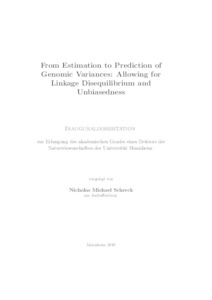|
From estimation to prediction of genomic variances : allowing for linkage disequilibrium and unbiasedness
Schreck, Nicholas
![[img]](https://madoc.bib.uni-mannheim.de/45274/1.hassmallThumbnailVersion/DissertationNS.pdf)  Vorschau |
|
PDF
DissertationNS.pdf
- Veröffentlichte Version
Download (4MB)
|
|
URL:
|
https://madoc.bib.uni-mannheim.de/45274
|
|
URN:
|
urn:nbn:de:bsz:180-madoc-452741
|
|
Dokumenttyp:
|
Dissertation
|
|
Erscheinungsjahr:
|
2018
|
|
Ort der Veröffentlichung:
|
Mannheim
|
|
Hochschule:
|
Universität Mannheim
|
|
Gutachter:
|
Schlather, Martin
|
|
Datum der mündl. Prüfung:
|
19 Juni 2018
|
|
Sprache der Veröffentlichung:
|
Englisch
|
|
Einrichtung:
|
Fakultät für Wirtschaftsinformatik und Wirtschaftsmathematik > Applied Stochastics (Schlather 2012-)
|
|
Fachgebiet:
|
310 Statistik
500 Naturwissenschaften
510 Mathematik
570 Biowissenschaften, Biologie
|
|
Normierte Schlagwörter (SWD):
|
Variance , Estimation , BLUP , Genetik , Genomik
|
|
Freie Schlagwörter (Englisch):
|
Genetic Variance , Genomic Variance , Linkage Disequilibrium , Prediction , Estimation , BLUP , Random Effects
|
|
Abstract:
|
In Chapter 1 of this thesis, we briefly summarize the theory about the genetic
variance from quantitative genetics, the genomic variance in
linear regression models, and relate these quantities to the ``Missing
Heritability''.
In Chapter 2, we introduce novel concepts of estimating the genomic variance
in accordance to quantitative genetics theory, i.e. the source of the genetic
variability stems from the variability in marker-genotypes and not from the
randomness of the marker effects.
We distinguish the analysis between Fixed Effect Models, Bayesian Regression
Models and Random Regression Models.
We adapt the estimators for the genomic variance to the specific model
set-ups and show that the resulting quantities explicitly include the
contribution of linkage disequilibrium.
We substantiate our theoretical findings in simulations studies in Chapter 3
by showing that our approach enables a reduction of the ``Missing
Heritability''.
|
|
Übersetzung des Abstracts:
|
Im ersten Kapitel dieser Dissertation fassen wir theoretische Resultate zu der
genetischen Varianz aus der quantitativen Genetik und Ergebnisse über
die genomische Varianz in linearen Regressionsmodellen zusammen. Außerdem
stellen wir den Zusammenhang zu der sogenannten "Missing
Heritability" her.
Im zweiten Kapitel führen wir neuartige Konzepte zur Schätzung der genomischen
Varianz ein, die im Einklang mit der Theorie aus der quantitativen Genetik
stehen.
Das bedeutet, dass als Ursache der genetischen Variabilität die Variabilität
in den Genotypen der Marker benutzt wird und nicht die Zufälligkeit der Effekte
dieser Marker. Wir unterscheiden Regressionsmodelle mit fixen Effekten,
Bayesianische Regressionsmodelle und Regressionsmodelle mit zufälligen Effekten.
Wir passen die Schätzer für die genomische Varianz an die spezifischen
Modellvoraussetzungen an und zeigen, dass die so erhaltenen Schätzer
explizit den Beitrag des Kopplungsungleichgewichtes enthalten.
Diese theoretischen Resultate werden in Kapitel 3 in Simulationsstudien
untermauert. Dabei zeigen wir, dass unser Vorgehen eine Verringerung der
"Missing Heritability" ermöglicht.
(Deutsch)
|
|
Zusätzliche Informationen:
|
Verf. hier: Schreck, Nicholas Michael
|
 | Dieser Eintrag ist Teil der Universitätsbibliographie. |
 | Das Dokument wird vom Publikationsserver der Universitätsbibliothek Mannheim bereitgestellt. |
 Suche Autoren in Suche Autoren in
Sie haben einen Fehler gefunden? Teilen Sie uns Ihren Korrekturwunsch bitte hier mit: E-Mail
Actions (login required)
 |
Eintrag anzeigen |
|
|
